Cash or card? Consumers pay strategically to forget guilty purchases, study shows
Published: May 17, 2023 / Author: Shannon Roddel
“Will you be paying with cash or card?”
It’s a question that’s been asked of consumers for decades. And despite the increasing popularity of digital payment methods, cash and card remain the most popular choices worldwide. In 2021, 65 percent of all point-of-sale transactions globally were made using cash or card, according to Fidelity National Information Services.
Past research shows that 90 percent of households use multiple payment methods, but new research from the University of Notre Dame takes a first look into how consumers choose between them. The study finds that the justifiability of a purchase affects how consumers choose to pay.
“Purchase Justifiability Drives Payment Choice: Consumers Pay With Card To Remember And Cash To Forget” is forthcoming in the Journal of the Association for Consumer Research from Christopher Bechler, assistant professor of marketing in Notre Dame’s Mendoza College of Business, along with Szu-chi Huang from Stanford University and Joshua Morris, data science manager for Nike.
“When a purchase is difficult to justify — like buying an overpriced bottle of water at the airport, cigarettes or candy — consumers pay with less-trackable methods, like cash, so they can eliminate the paper or electronic trail and ‘forget’ this guilty purchase,” said Bechler, who specializes in consumer behavior and social psychology with an emphasis on attitudes, persuasion and financial decision-making. “When a purchase is easy to justify, consumers have no problem paying with trackable methods like credit cards that create paper or electronic trails.”
Despite the vast amount of research on financial decision-making in behavioral economics, consumer behavior and social psychology, this is the first study to take an in-depth look at how consumers choose to pay.
The team analyzed real transaction data from 118,042 purchases and manipulated the justifiability of purchases consumers imagined making in six experiments on more than 5,000 individuals. They hoped to capture the causal effect of hard-to-justify purchases on consumers’ intentions to use cash vs. a credit or debit card.
“I think a lot of consumers — particularly those who diligently track their card expenses — recognize that they use cash so they don’t have to think about certain purchases again,” Bechler said. “In fact, this strategy of using cash to hide purchases from ourselves if we feel bad about them is something my co-authors and I admitted to doing ourselves.”
The findings show merchants it’s a good idea to be strategic with the types of payment methods they allow.
“A doughnut shop could benefit from letting its customers pay with cash because they may want to forget their unhealthy purchase,” Bechler said. “A salad shop might not see the same benefit.”
And as the world turns to cryptocurrencies and new payment methods, the study underscores implications for both merchants and financial institutions designing payment methods of the future. Bechler said understanding the factors that affect how consumers choose to pay could be important for predicting which new methods will garner widespread adoption.
Related Stories




